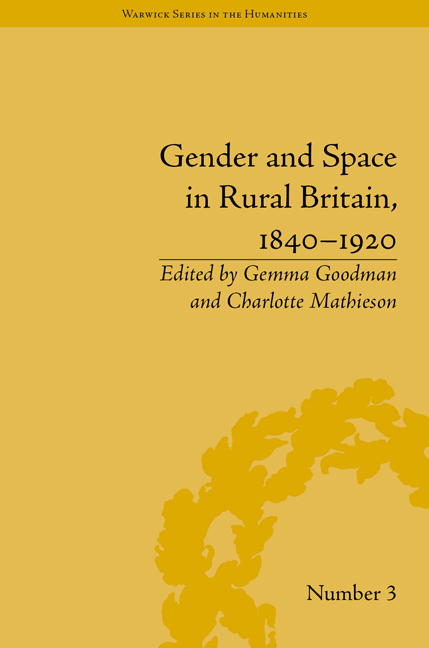Book contents
- Frontmatter
- Contents
- Acknowledgements
- List of Contributors
- Introduction: Gender and Space in Rural Britain, 1840–1920
- 1 Women in the Field
- 2 ‘Between Two Civilizations’: George Sturt's Constructions of Loss and Change in Village Life
- 3 At Work and at Play: Charles Lee's Cynthia in the West
- 4 ‘Going Out, Going Alone’: Modern Subjectivities in Rural Scotland, 1900–21
- 5 ‘Drowned Lands’: Charles Kingsley's Hereward the Wake and the Masculation of the English Fens
- 6 ‘Wandering Like a Wild Thing’: Rurality, Women and Walking in George Eliot's Adam Bede and The Mill on the Floss
- 7 ‘I Never Liked Long Walks’: Gender, Nature and Jane Eyre's Rural Wandering
- 8 Gertrude Jekyll: Cultivating the Gendered Space of the Victorian Garden for Professional Success
- 9 From England to Eden: Gardens, Gender and Knowledge in Virginia Woolf's The Voyage Out
- 10 The Transnational Rural in Alicia Little's My Diary in a Chinese Farm
- Notes
- Index
3 - At Work and at Play: Charles Lee's Cynthia in the West
- Frontmatter
- Contents
- Acknowledgements
- List of Contributors
- Introduction: Gender and Space in Rural Britain, 1840–1920
- 1 Women in the Field
- 2 ‘Between Two Civilizations’: George Sturt's Constructions of Loss and Change in Village Life
- 3 At Work and at Play: Charles Lee's Cynthia in the West
- 4 ‘Going Out, Going Alone’: Modern Subjectivities in Rural Scotland, 1900–21
- 5 ‘Drowned Lands’: Charles Kingsley's Hereward the Wake and the Masculation of the English Fens
- 6 ‘Wandering Like a Wild Thing’: Rurality, Women and Walking in George Eliot's Adam Bede and The Mill on the Floss
- 7 ‘I Never Liked Long Walks’: Gender, Nature and Jane Eyre's Rural Wandering
- 8 Gertrude Jekyll: Cultivating the Gendered Space of the Victorian Garden for Professional Success
- 9 From England to Eden: Gardens, Gender and Knowledge in Virginia Woolf's The Voyage Out
- 10 The Transnational Rural in Alicia Little's My Diary in a Chinese Farm
- Notes
- Index
Summary
They have no time to sit and look at Nature. Their life is one long fight with her. I am ashamed sometimes. This painting as a life-work – it is playing at living. They live.
So says Mr Forrester in Charles Lee's novel Cynthia in the West. Published in 1900, the novel is set in the fictional Cornish fishing village of Tregurda. ‘They’ are the local inhabitants whose lives and livelihood is entirely dependent on the sea. Being both a local man and a painter, Forrester occupies a unique position in the novel – his perspective on the workers is sympathetic and, as can be seen above, makes him question painting as an occupation. Yet within the novel he socializes with a colony of painters who have descended on Tregurda from London. They view the local inhabitants with scorn, distrust and as an ‘alien race’ and it is the complex relationship between the two groups which Lee's novel explores.
Charles Lee was a popular novelist in his own lifetime but he and his work have largely dropped out of cultural consciousness. He has received a small amount of recognition in the last twenty years with the republication in 2003 of his anthology of bad verse The Stuffed Owl.
- Type
- Chapter
- Information
- Gender and Space in Rural Britain, 1840–1920 , pp. 41 - 54Publisher: Pickering & ChattoFirst published in: 2014

